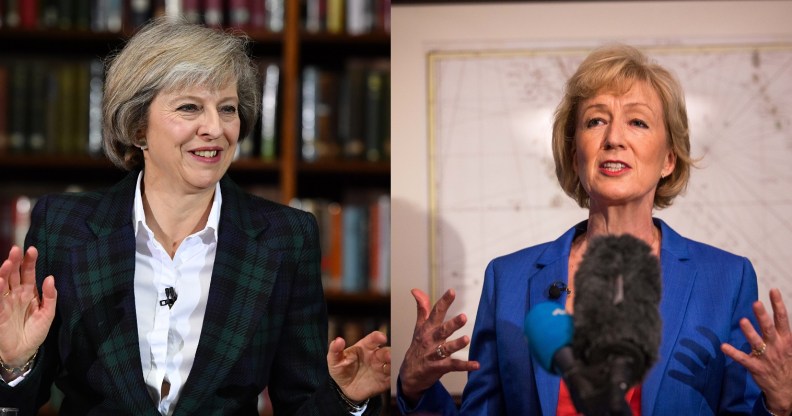Theresa May set to become PM as same-sex marriage opponent Andrea Leadsom drops out of race

Theresa May will become the UK’s next Prime Minister on Wednesday – after her only remaining opponent Andrea Leadsom dropped out of the race.
Tory leader and PM David Cameron confirmed his plans to resign last month in wake of a vote to leave the European Union.
As the Conservatives hold a majority in Parliament, the winner of the contest to succeed him as Tory leader – decided by Tory MPs and Conservative Party members – will automatically become Prime Minister.
Of the five candidates who came forward, the party’s MPs have whittled it down to Home Secretary Theresa May, and pro-Brexit energy minister Andrea Leadsom.

But today Ms Leadsom has withdrawn from the race – paving the way for Mrs May to become Prime Minister imminently.
A new MP in 2010, Ms Leadsom entered Parliament after the bulk of LGBT rights legislation had already been passed. She ‘positively abstained’ on equal marriage in 2013, voting both in favour and against citing the views of her constituents.
But the candidate has faced a string of controversies in the past few weeks. PinkNews reported last week that Ms Leadsom had previously claimed that straight adoptive parents should have priority over gay couples in the adoption process.
In posts from 2007 and 2009, Ms Leadsom suggested a ‘points-based’ adoption system that gives preference to “a married man and woman as potential adopters”.
The MP came under fire again after saying in an interview she “didn’t like” same-sex marriage law – claiming it “harms” Christians.
She has also faced questions over her links to an evangelical project in Uganda which advocates gay ‘cures’, and was ridiculed after a contested interview in which she appeared to suggest she had the edge over Mrs May because she is a mother.
She confirmed she would drop out of the race today. Ms Leadsom said it was not in the interest of the party to continue a leadership election.
David Cameron will now stand down on Wednesday, with Mrs May set to take office on Wednesday.

Home Secretary Theresa May has a mixed historic record on LGBT rights, entering politics as an opponent but becoming a supporter of equality under David Cameron.
Under Iain Duncan Smith’s leadership, Mrs May obeyed the Tory whip to vote against many early reforms, including an equal age of consent and same-sex adoptions – even when others including George Osborne and Boris Johnson rebelled.
In 2004, under leader Michael Howard, she voted in favour of civil partnerships.
Under David Cameron’s leadership, it was Mrs May who helped ensure that proposals for equal marriage made it onto the agenda – promising a review ahead of the 2010 election, and in government working alongside Lib Dem Lynne Featherstone to secure Coalition-wide agreement.
Baroness Featherstone, the architect of the equal marriage law, has since said that May’s support was instrumental in convincing the Conservative leadership to agree to the Lib Dem proposal.
But Mrs May has faced strong criticism on other LGBT issues.
A review of the treatment of LGBT asylum seekers was carried out by the Home Office in 2014, but the Home Secretary has since been criticised by asylum groups, who say that in some ways conditions have worsened under her tenure.
She also mooted plans to withdraw from the European Convention of Human Rights, which guaranteed some of the UK’s earliest LGBT rights protections. The Home Secretary ditched the “divisive” plan as she launched her leadership bid.
In a statement last week, Mrs May said: “When I launched my campaign for the leadership I set out my belief in building a country that works for everyone. Central to that vision is a commitment to equality, and I will always stand up for the rights of LGBT people.
“I supported Civil Partnerships in 2004, and was proud to sponsor the legislation that introduced full marriage equality in 2013 because I believe marriage should be for everyone, regardless of their sexual orientation.
“I didn’t believe the State should perpetuate discrimination and prejudice against LGBT people. That’s why equal marriage was a hugely significant social reform. And it also made a powerful and important statement that as a country we value and respect everyone.
“For me, equality is about fairness. It is simply wrong for anyone to face discrimination or abuse because of who they are or who they love.
“A Conservative Government under my leadership would be unequivocally committed to supporting LGBT people, and continuing the vital task of tackling hate crime, homophobia and transphobia – both in the UK and around the world.
“I firmly believe in an open, inclusive, One Nation agenda of social reform which will change our country for the better. That is what I would offer as Prime Minister.”

